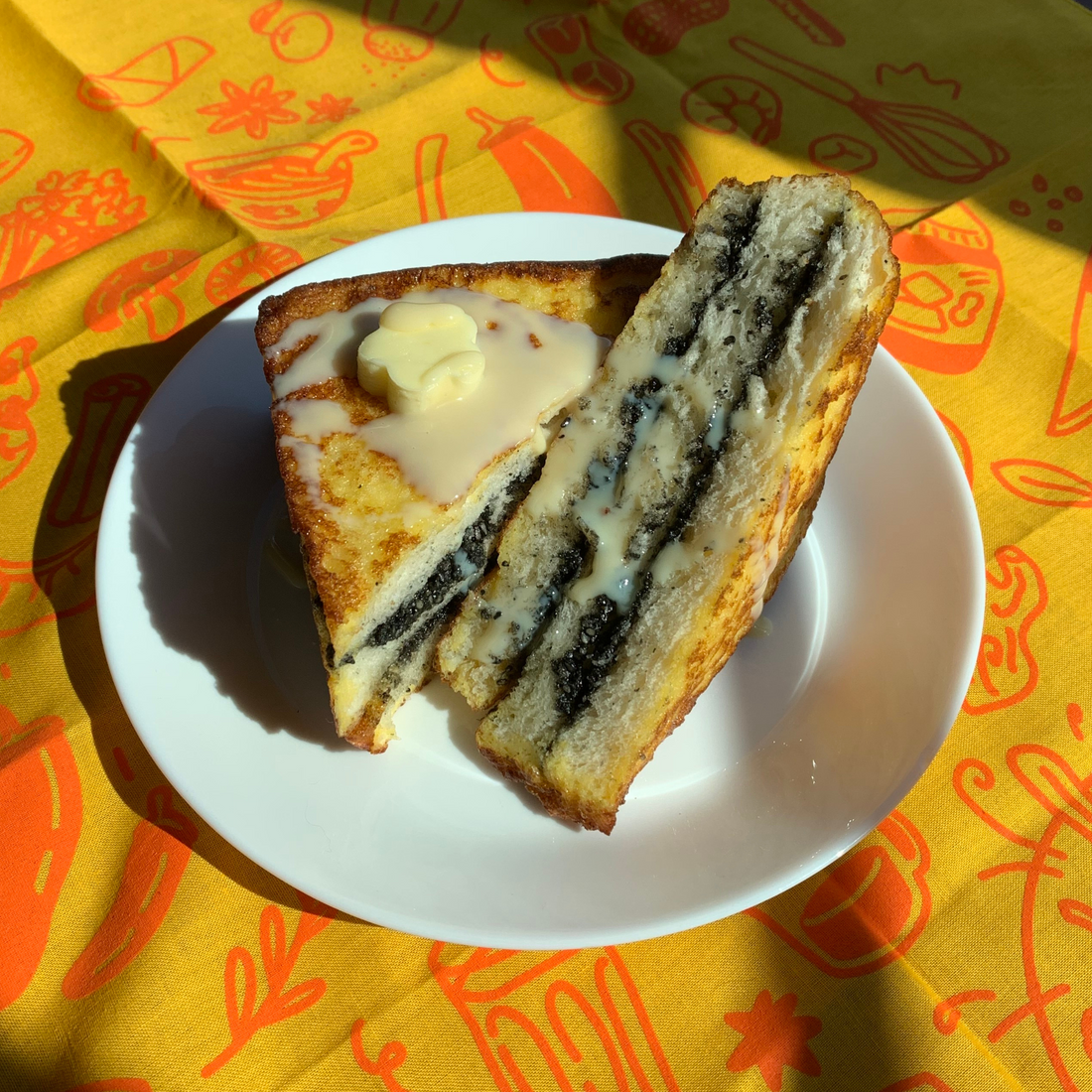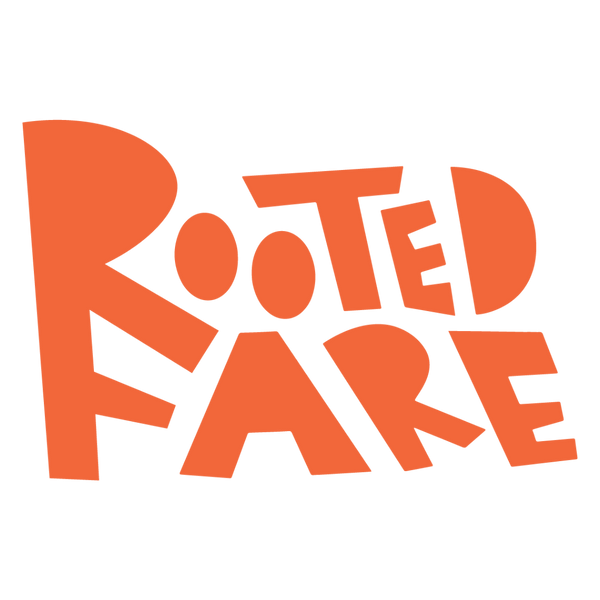
HK Style French Toast with Black Sesame Crunchy Butter
Share
Recipe and post by Liana Fu. Follow her on Instagram @mushroomhatersonly.
Scroll to the bottom to see our full interview with Liana!
**********
HK Style French Toast with Black Sesame Crunchy Butter
Prep + Cook: 10-15 mins
Serves: 1

Ingredients
- 3 slices of milk bread
- 3 tbsp rooted fare black sesame crunchy butter
- 1 egg
- 1/2 cup vegetable oil
- 1 tbsp of butter
- 1 tbsp condensed milk
Steps
- Spread a thin layer of Black Sesame Crunchy Butter on two slices of milk bread. Sandwich with a third slice of milk bread in the middle so that the black sesame sides are facing inward and you have a three-tiered sandwich.
- Cut off the crusts of the three-tier sandwich with a sharp knife to create a square shape. Eat the crust!
- Whisk egg in a shallow bowl and quickly dip each side of the sandwich in the egg mixture, letting the excess drip off.
- Heat vegetable oil on medium low and carefully drop the sandwich into the oil, frying for about 30 seconds on every side until light golden brown. Once fried, let it cool on a plate with a paper towel to soak excess oil.
- Serve with butter and a drizzle of condensed milk. Enjoy!
We'd love to know how you liked the recipe! Share your creation and tag us @rooted.fare on Instagram or @rootedfare on TikTok for a chance to be featured.
**********
Interview with Liana Fu

What is your name, pronouns, and where are you based?
I’m Liana, I use they/she pronouns, and I’m based in Chicago. What do I do now? …I guess I’m a food influencer (laughs). I also work as a digital organizer at an environmental nonprofit in Chicago. My life is full of comms and social media. I think my food account has definitely been a creative outlet outside of just work. So it’s been nice – it’s kind of silly (laughs). It’s been fun.
How did you get started with cooking and making content?
I started in 2021, I think April – I did it kind of as a joke (laughs). It was like a Finsta account, and I was still in school then. I was about to graduate, and I was really stressed about finding a job, so I was like “what if I made a food account” because it’s a way to get income potentially. I was not taking myself that seriously, but then it kind of became a serious thing. I think my very first post’s caption was “yes I started a food account to avoid thinking about jobs, help me get clout”, so it’s always been kind of a meme for me where I laugh at myself a lot. And because it’s fun, it’s an important motivator to just keep posting, and I’ve surprisingly met a lot of online friends because of it. I’ve connected with some people in person, but also just virtually from all over the world—people in Chicago, SF, New York, Hong Kong, Singapore, Vienna…which is really cool. And it also just became my public oversharing journal (laughs), because I write a lot in my captions and I think it’s just a very fun, low stakes thing, and a way to express myself. I went to college for creative writing, so my main artistic practice is writing, but the past two years have been really difficult for me to get inspired or feel like I have any motivation to create, so this has been good in the meantime.
You've done some collaborations with brands like Fly by Jing. What was that like?
I think first of all I’m always surprised when a brand wants to work with me. Because again I feel like this is a silly thing that I do and suddenly someone takes interest, then I’m like oh why do they care about this (laughs). So it’s pretty insane that FBJ reached out to me because I didn’t think they would do that, it was unexpected. It was really fun to flex my creative muscles to make something that was related to Turning Red while also using their product. Everytime I do a collab it’s like an exercise of “okay, how can I work with the limitations?” That also makes it fun because…I like being creative and finding ways to use my imagination or be different within those constraints. The stuff I make usually, I think, turns out pretty well. Thank you for saying that my stuff is really unique because I honestly don’t feel like it’s that unique or challenging to make the things I make, but it’s maybe part of the appeal as well. It’s very true to my personality and who I am, I just make the very cute simple things that make me happy and enjoy eating. It makes me feel like oh, I’m being seen for the things that I like. And I also personally really like curating aesthetics, and Instagram is kind of the perfect platform for that.
Why is your Instagram name "Mushroom Haters Only"?
I just don’t like mushrooms. And that’s the only food I don’t like. I just had a really bad experience eating this disgusting mushroom when I was little (laughs). Like one of those canned mushrooms…I hated the texture and smell of it, it ruined it for me for the rest of my life. But I do like the Asian mushrooms, like woodear. But I think my mind can be changed. I’m just holding onto this because it’s such an integral part of my personality that I’ve made into this whole thing (laughs). People have definitely messaged me, been in my DMs asking “why do you hate mushrooms,” “what does it mean?” There are a lot of people who love mushrooms, and I understand that because it adds that umami flavor. I can appreciate that, but I think something about the texture throws me off. I just use the aesthetics of mushrooms a lot because I like how they look–cute. But I don’t like eating them.
What are some inspirations for your work?
For my food stuff, lately I’ve been following a lot of Cantonese American food accounts such as @madewithlau and @feibabacooks. They help me practice Cantonese because I’m still trying to get better, and show me how to make the dishes I ate growing up. There are also a lot of friends I made in the food community, who are definitely very important for me: @angelaunni, @morningoal, @sugarplumcheeks, @gingerjook, @stuffponomakes, @bunrieubabey, @stinkykitchen, @ayecooks, @theduskykitchen, @sik__fan, @h0mec4fe, @cakesniffing, @everythingalexcooks. I think in my life in general, my mom and my grandma cooked a lot of the meals I ate growing up. I think I really learned how to cook in college, so I don’t really have that story of “my grandma taught me how to cook and now I cook all her recipes.” I didn’t really experience that, I cooked out of necessity, you know, a need to survive in school. I was starting to live off campus, and I just needed to make food. It didn’t really become enjoyable to me until I started to cook for other people. I really like creating this community space to come together around food. And the food I cooked in the beginning was not good, it was definitely underseasoned, it was bad (laughs). I’ve learned a lot since then, and it’s cool to see my own growth in that way, where cooking and baking have become more intuitive and creative for me.
What does being Cantonese American mean to you and how has it influenced your work/life?
It’s kind of a heavy question for me. I’m also a writer, and a lot of the things I’ve written in the past explore identity and migration. I’ve spent a lot of time researching and thinking about it. Being Cantonese American really affects the way I see myself, the way I see language, food, art, community – everything. This is a lens with a specific cultural and historic background that I see the world through. And it’s specific for me to Hong Kong and to America and the migration between them. There’s actually a project I’m working on right now about the Angel Island Immigration Station in SF, because I realized after doing some research that my great grandpa went through there in the 40s. It was a place where a lot of Cantonese people went through and were detained and questioned. Doing this research better informs the perspective I have of myself; knowing that history helps me understand this country and also the language we use around freedom and progress and productivity. So it’s a very self and historical investigation that has led to a lot of discoveries about the power and resilience of my ancestors, which has been really cool. I also in that research found out that there was a hunger strike that happened on Angel Island that was organized by the detainees, and I was like oh I never knew this and I probably wouldn’t have known if I didn’t really dig into that history. There’s just a lot to unpack and discover and I think I’m constantly learning and growing in that. It’s always on my mind.
What is your favorite way of using Black Sesame Crunchy Butter?
I really like it on milk bread, and adding white peaches is really good too. I just enjoy it with something sweet, because I was actually kind of surprised by the flavor. I expected the butter to be sweeter, but I like how it’s not. I can taste the black sesame and it feels like it’s a dessert in itself almost. It pairs really well with sweet things. The recipe I’m sharing is Hong Kong style French Toast.
Where can people find you?
My instagram (@mushroomhatersonly), and I also have a website (lianafu.com), I post my writing there sometimes.
What are you listening to?
I’m listening to the New Girl’s Generation album: FOREVER 1.
**********
Liana Fu (they/she) is a queer nonbinary Cantonese writer and organizer from Chicago. She studied at the University of Chicago while organizing for student of color power. She is a Pushcart Prize nominee, Lambda Literary Fellow, and Scholastic Art & Writing national silver medalist with an affinity for hybrid forms. Using critical race and gender theory, their creative practice playfully reimagines, critiques, and builds upon the Cantonese diasporic archive as a contested site of imperialism and capitalism. You can find their work in Hyphen Magazine, The Margins, Glass Poetry, and elsewhere. In their free time, they enjoy running their food instagram (@mushroomhatersonly) and making zines.
Check out her website here !
